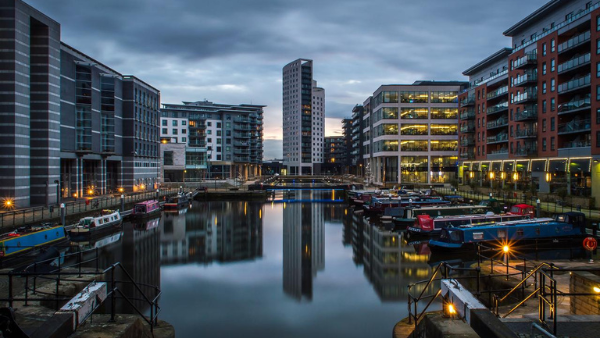How do you transform a nation into the most creative place on earth? Or for that matter how do you transform a region, city or town? In short, how do you unlock a creativity revolution?
As any reader of this blog site over the last week will have realised, the idea of unleashing creativity is becoming central to the RSA's sense of its own mission, so this question is close to our heart right now. Given how important creativity is to our personal, social and economic well-being (see my last post), it should, I think, be close to everyone’s heart.
So here are my suggestions for the elements of a creativity revolution. This emerging world view for the RSA is still very much in the developmental stage, so please feel free to suggest other elements or dispute the ones I’ve chosen.
1. Start a million mission movement
As I’ve written elsewhere something fascinating is happening amongst the so-called millennial generation. Increasing numbers are seeing entrepreneurialism as a viable and attractive career route.
But this is not enterprise as presented on programmes like The Apprentice; it is driven by mission rather than money. These young entrepreneurs are excited by the idea of using their own unique skills and vision to be an agent of change. And I reckon there are few better definitions of creativity than that.
This zeitgeist needs to spread more generally to the whole population. Could we jointly create, for example, a ‘million mission movement’ where people are encouraged and supported to shape their lives around a specific mission designed to create a better life for themselves and a better world for others? A movement not in pursuit of a single ideological or campaign goal like most previous social movements but one which seeks to unleash a million plus visions for how to do things better.
The missions could be any number of things: everything from establishing the best cab company in North Manchester to sending the first human to Mars; from raising the happiest kids possible to creating the most innovative education system in Wales.
The point is that such a cultural movement would be the beginnings of that creativity revolution. Once you commit yourself to excel at a particular mission you are forced to think creatively because you have to do things better or differently from everyone else. Or, at the very least, you have to adapt the best way of doing something to your own unique circumstances and capacities.
A million mission movement would be enormously challenging to the sticky, anti-creative remnants of the culture that existed before 2008. Focusing your life on a creative mission undermines the idea that the purpose of being is to buy stuff. It challenges the notion that it is acceptable purely to generate income no matter whether you or your organisation are actually doing something of economic, consumer or social benefit.
2. Educate for creativity
Many of the creative young entrepreneurs I mentioned above and to which the RSA has spoken over the last couple of years are rarely flattering about their schooling. They either see it as having made little contribution to their career and life choices or, worse, as having positively hindered those choices.
This is hardly surprising. As Ken Robinson explains in the second most watched RSA Animate (11 million plus views!), education around the world is still trying to shape children to be fit for a post-war economy that divided the world into an elite of clever, creative leaders and a mass of dim drones able to do little more than produce and consume. As I mentioned in my last post and a longer pamphlet, the global economy is accelerating away from such a structure at speed: it is an economy in which success is driven by the creativity of all not of an elite.
The result is that for millions of children, education has become a deadening rather than an awakening experience. Students and teachers are forced to think of education in purely instrumental terms where all you learn is only designed to get those qualifications to get that traditional job to earn that money to buy those things. A radical shift is needed where education becomes an opportunity to discover what you as a unique individual are great at, to identify your life’s mission and understand how you can put the former to the service of the latter.
This is not a cry for a return to the woolly notions of unstructured self-expression that shaped progressive education in the 1970s. Being truly creative in serious pursuit of a personal goal requires discipline, hard work and a set of generic skills that need to be learned, tested and perfected.
But it also requires the time and freedom to allow students to discover and refine their own sphere of excellence. Sadly this is a space that is being closed down by politicians who think they can design a single, centrally enforced curriculum for the millions of diverse children who pass through an education system. This has been going on for years and if anything is only getting worse. In the name of creativity, it’s time for a popular backlash.
3. Let the small flourish
An explosion of creativity based on a million plus missions inevitably means the explosion of small scale ventures. Ultimately big organisations cannot compete with the way small ventures spring directly from the desire of a creative individual or individuals to fulfil a mission. Nor can an economy dominated by the feather-bedded big compete for sheer creativity with an economy where the big is constantly challenged by the small.
Letting the small flourish requires a stripping out of all those state activities that keep the big in business and the small consigned to the sidelines. We could start, for example, by making it a requirement for officials at every level of government to explain why each new contract cannot be let to small businesses, charities or community groups. Similarly, big infrastructure decisions, such as over transport or construction, should be required to show that they have not been taken in a way that deliberately benefits big business over small. The burden of proof needs to be on those who want to back the big – the very opposite in fact to how government works today.
Ultimately, however, the small will flourish when the shift amongst consumers towards the authentic, the bespoke and the human deepens further. This trend is well underway and it is a cultural as much as an economic issue. An upstart insurgency that cries ‘creativity’ would nudge it along nicely.
4. Keep the politicians out
Politics, sadly, is the very opposite of creativity. Politics, as it is currently conceived, is inherently elitist. It is fundamentally about formally delegating power and decision-making to a tiny leadership class. If creativity is driven by our pursuit of a personal mission for a better life and a better world then we cannot expect to remain creative if we hand that mission over to someone else to fulfil.
A genuine creativity revolution needs to be driven by millions of people acting creatively. It can’t be ordained from above and it certainly must not be led by people who will ditch or warp the notion as soon as it becomes politically or personally expedient to do so.
In fact, a central goal of a creativity revolution may be to develop a fundamentally different way of doing politics that, like Ken Robinson’s new education paradigm, awakens rather than deadens the population.
You can follow me on Twitter here.
Related articles
-
Culture should be at the core of West Yorkshire's economic plans
Andy Haldane Tracy Brabin
Andy Haldane and Tracy Brabin, Mayor of West Yorkshire, discuss how investing in culture and creative industries can make a success of local growth and levelling up.
-
The impact of arts-based education
Mark Londesborough
Mark Londesborough on the findings from the final Learning About Culture report and the implications for arts-based learning.
-
How young people are shaping social change despite Covid-19 challenges
Aidan Daly
Despite the pandemic, school pupils are demonstrating creative confidence and a commitment to making their communities a better place.



Join the discussion
Comments
Please login to post a comment or reply
Don't have an account? Click here to register.
Adam,
I love what you said about education. However, what specifically was so wrong with the "progressive education in the 1970s?" I only have a vague conception of what happened during that time, so I would very much appreciate some details about what was going on and what aspects of it you believe were harmful.
Hi Adam
Perhaps the 100 plus people we hope to involved in the Future Shift incubator and accelerator programme in Birmingham and the Black Country might be some early members of the million mission movement. The focus of the programme is around civic system change (see http://www.civicsystemslab.org), it's the second Hub Launchpad programme (http://www.hublaunchpad.net). I hope to share a little about it in next month's Fellowship Council meeting, and our team will be blogging and tweeting just as soon as we get our website and branding bits and bobs sorted. I hope to connect with RSA Fellows in the region who might be interested, or would be able to refer us to potential participants. I can be contacted on twitter through the @RSAwm account as well as my own.
Cheers
Lorna
Thanks for the comment. I wanted to bring 3D printing etc. into the post but it was getting too long! So thanks for raising it. Good points.
Hi, I like this topic and I see society going more and more in that direction. It seams we are going in a post industrial society where like you said a lot of small group of people will challenge in different ways large group (like companies big companies). Many people turn to freelance and such but there is also that trend I see with certain industries like 3D printing. This emerging industry will probably crush traditional manufacturing companies in many ways. The main one being the logistic/value chain that will be bypassed almost entirely. People will be able to produce on demand at their home all kinds of goods (all you need is a 3D printer and the internet). Everybody will be able to produce what they really need and supply and demand will be perfectly matched. You won't need big factories and assembly line for many kinds of goods anymore. Also, the whole idea of 3D printing is pretty much creativity oriented. Some people create their cad files with their drawing software for all kinds of products and other people can just download them and produce them directly at their place. It's like the quintessentiel open source economy. I'm really looking forward to it!